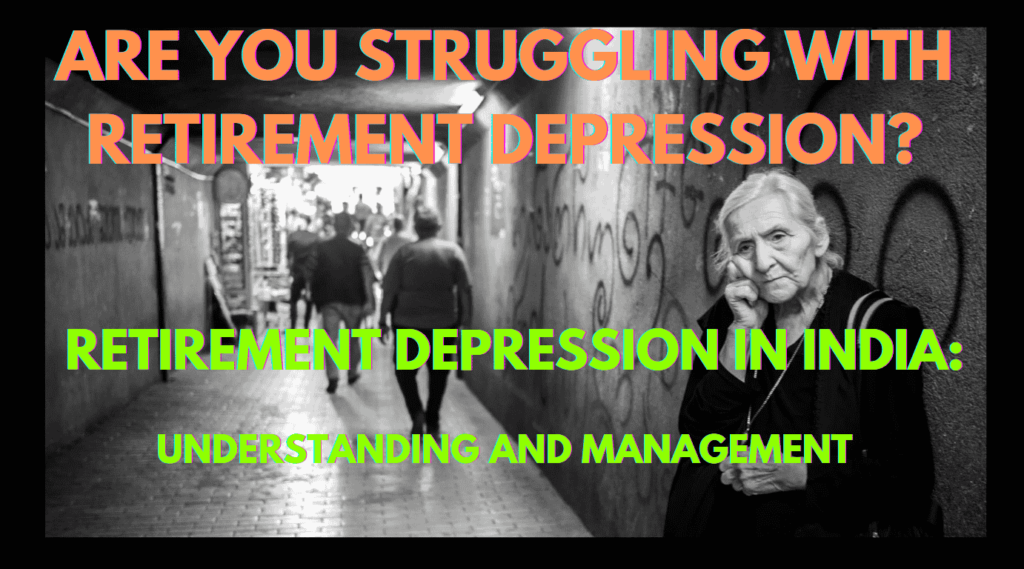Retirement Depression in India: Understanding and Management

Quick Overview
Retirement depression is an emerging mental health concern in India, characterized by feelings of emptiness, loneliness, and worthlessness that can lead to clinical depression. As individuals transition from active work life to retirement, they often face significant emotional challenges. However, with proper planning, emotional support, and professional help, retirement depression can be effectively managed and even prevented.
Key Points
- Emotional Challenges of Retirement: Many retirees experience feelings of loneliness and loss of purpose, leading to depression.
- Changing Family Dynamics: The shift from joint families to nuclear families has increased feelings of isolation among retirees.
- Signs and Symptoms: Common indicators of retirement depression include lack of motivation, persistent low mood, and anxiety.
- Prevention Strategies: Planning ahead, establishing routines, and maintaining social connections can help prevent retirement depression.
- Management Approaches: Seeking professional help, joining support groups, and adopting healthy habits are crucial for managing retirement depression.
Detailed Breakdown
Emotional Challenges of Retirement
Retirement is often seen as a time of freedom and relaxation, yet many individuals find themselves grappling with unexpected emotional challenges. The transition can lead to a sense of loss, as retirees may miss the structure, purpose, and social interactions that their work provided. Dr. Aarti Anand, a senior consultant in psychiatry, notes that this can manifest as feelings of aimlessness and isolation.
Changing Family Dynamics
The traditional support systems that once aided retirees, such as joint families, are gradually diminishing in India. As more families adopt nuclear structures and urban migration increases, many elderly individuals find themselves isolated. Nishtha Jain, a counseling psychologist, emphasizes that this lack of social support contributes significantly to the rise of retirement depression.
Signs and Symptoms
Recognizing the signs of retirement depression is crucial for early intervention. Symptoms may include:
- Exhaustion: A persistent lack of energy and motivation.
- Low Mood: Continuous feelings of sadness or hopelessness.
- Anxiety: Generalized anxiety about the future or daily activities. These symptoms can be exacerbated by financial instability, health issues, and reduced social interactions, as noted by psychologist Sumalatha Vasudeva.
Prevention Strategies
Preventing retirement depression begins with proactive planning. Here are some expert-recommended strategies:
- Plan Ahead: Financial and emotional preparations are essential before retiring. This includes budgeting for retirement and considering future lifestyle changes.
- Establish a Routine: Maintaining an active lifestyle through hobbies, volunteering, or part-time work can provide structure and purpose.
- Social Connections: Expanding social networks and maintaining relationships can combat feelings of loneliness.
- Physical Activity: Regular exercise is vital for both physical health and mood enhancement.
- Learn New Skills: Engaging in new hobbies or educational pursuits can stimulate the mind and provide a sense of achievement.
Management Approaches
For those experiencing retirement depression, seeking professional help is a key step. Mental health professionals can provide therapy to help retirees navigate their emotional challenges. Additionally, here are some strategies for managing retirement depression:
- Join Support Groups: Engaging with others in similar situations can alleviate feelings of isolation.
- Adopt Healthy Habits: A balanced diet, regular exercise, and mindfulness practices like yoga can significantly improve mental health.
- Set Goals: Establishing small, achievable goals can foster a sense of accomplishment and purpose.
- Family Support: Open communication with family members allows retirees to express their feelings and seek emotional support.
Important Details & Evidence
Research indicates that retirement depression is becoming increasingly recognized among Indian populations. Experts attribute this rise to societal changes, including the breakdown of traditional family structures that once provided emotional support. The lack of hobbies outside of one’s career can also contribute to feelings of purposelessness. The consequences of retirement depression are serious, potentially leading to chronic health issues, cognitive decline, social withdrawal, and even substance abuse.
Final Takeaways
Retirement depression is a significant mental health concern that can arise from the emotional challenges associated with leaving the workforce. With the right strategies in place—such as planning ahead, maintaining social connections, and seeking professional help—individuals can prevent and manage these feelings effectively. As society evolves, it is crucial to recognize the importance of emotional well-being in retirement, ensuring that retirees can enjoy this new phase of life with fulfillment and purpose. By fostering supportive environments and encouraging active lifestyles, we can help mitigate the impact of retirement depression in India.